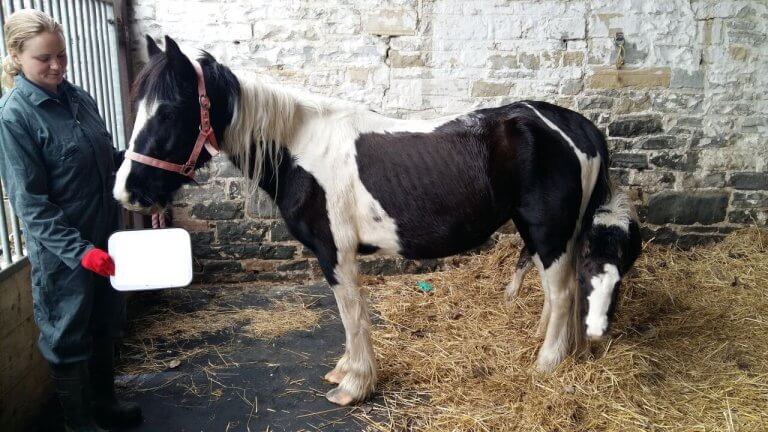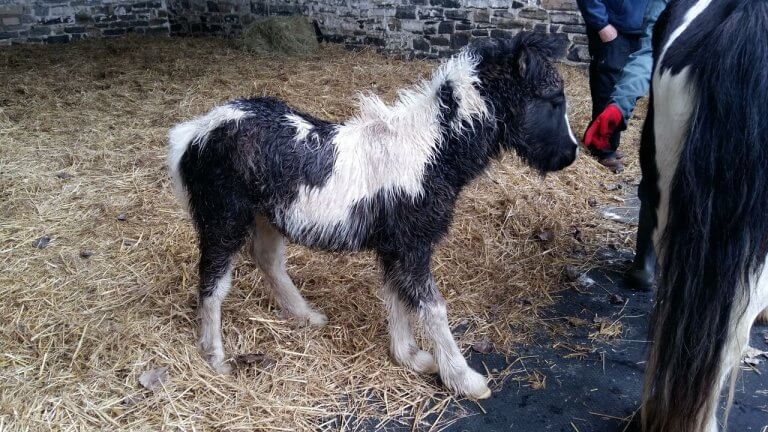When Dolly was discovered by a World Horse Welfare Field Officer in Dorset in March 2017 she was emaciated, weak and struggling to survive whilst still taking care of her very young foal, Rocket.
Dolly’s body condition score was recorded as 1 out of 5, and it was clear she needed urgent veterinary attention. Her owner signed her over into World Horse Welfare’s care and she was transported to the safety of the charity’s Glenda Spooner Farm Rescue and Rehoming Centre in Somerset.
Glenda Spooner Farm Supervisor, Grace Vooght, said:
“When Dolly first arrived she was very thin with all of her ribs and vertebrae clearly visible. When new horses come into our care they are always examined by our vet and routine blood tests are undertaken to ensure they are not suffering any underlying problems. When Dolly’s results came back it became apparent she was suffering from severe liver damage which could have been caused by a number of poisons.
“One of the most common causes of liver damage that we see is ragwort poisoning but without knowing her background, it was difficult to determine what had caused Dolly to be in such a terrible condition. The first step was to wean Rocket onto eating more independently so he was less reliant on Dolly’s milk, which worked well as he was quite a greedy foal. This allowed Dolly to put what little energy she had into repairing her damaged liver.
“Unfortunately Dolly’s condition didn’t seem to be improving and new blood tests showed that her liver was not repairing in the way it should be. We continued to monitor Dolly and provide her with all the nutrition she needed so she could bring up her young foal and it was very much touch and go as to whether she would survive.
“After a few months of dedicated care and attention, Dolly miraculously began to recover and her liver finally started to function properly, which amazed us all. Both ponies are now living out in their herds and have undertaken their handling training as well as learning to go into a trailer – all in preparation for them to find loving new homes on our rehoming scheme.
“Dolly’s recovery really is miraculous and I can’t wait to see both her and Rocket settled into happy new homes.”
World Horse Welfare Chief Field Officer Claire Gordon is urging owners to remove the plant which, if eaten, can cause irreparable liver damage to horses.
“It’s vital that your horse doesn’t eat ragwort, and you can’t assume they will choose not to eat it.
“Spraying in April and early May while the plant is growing is the most effective way to eradicate it from your pasture, but you must be able to rest the field after spraying. For those without access to additional grazing, pulling the whole plant up – including the roots – is the next best option.
“It’s best to do this at the seedling or rosette stage, before the plant flowers and while the ground is still soft – so the sooner you act, the better.
“Seeds can remain in the ground for 15 years before germination, so even if you’ve removed ragwort in previous years, it’s important to do it again every year.”
To find out more about ragwort and the dangers it poses to horses visit:http://www.worldhorsewelfare.org/ragwort
Rehome Dolly: http://rehoming.worldhorsewelfare.org/horseprofile/928
Rehome Rocket: http://rehoming.worldhorsewelfare.org/horseprofile/931
For more information please call Carys Samuel on: 01953497248 or 07826 871 682 or Jessica Stark on: 07900 994002 or email caryssamuel@worldhorsewelfare.org / jessicastark@worldhorsewelfare.org
Search
Recent Articles
Categories
- Advice Hub
- Athlete
- Carriage Driving
- Dentistry
- Dressage
- Endurance
- Eventing
- Farrier
- Featured
- Featured Horse Ads
- Featured Posts
- Horse Racing
- Horse's Mouth
- Horseball
- Hunting
- Le Trec
- Leisure Riders
- Mounted Games
- Nutrition
- Polo
- Polocrosse
- Reining
- Rescue & Rehabilitation
- Show Jumping
- Showing
- Tack Room
- Team Chasing
- The Pony Club
- Therapy
- Training
- Vaulting
- Veterinary






